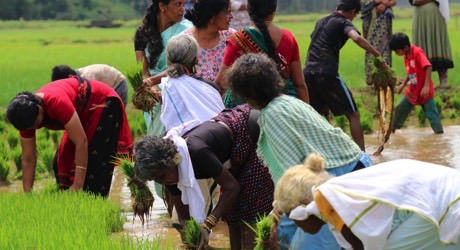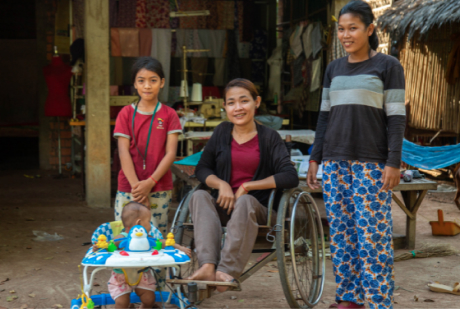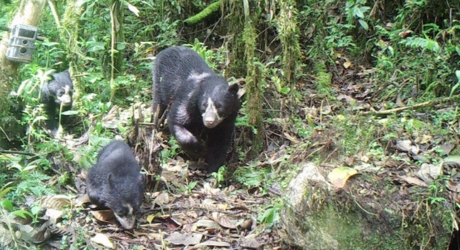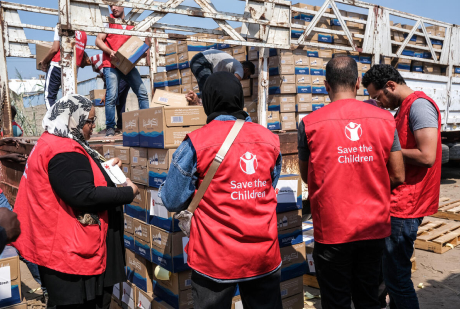Footprints Project
Since 2005, travelers like you have helped us change the world through micro-donations.

-
A total of
3245
Travelers
-
donated
$10004.74
(100% funded) -
to help improve
Food Security
-
impacting
10195
people -
in
India
Project Background
In India, the government considers tourism a panacea for development and is promoting it intensively both nationally and internationally. However, tourism policies and programs are by and large biased to big players. This has resulted in promotion of mass tourism with immense negative impact on local communities and their surrounding environments. To address these development concerns, Kabani has started facilitating community involved tourism programs in villages over the last twelve years.
This project will be implemented in Kottathara, an agrarian village in the Wayanad District of the State of Kerala, South India.
The farmers in this village are facing a huge agrarian crisis due to low crop prices and yield along with unpredictable changes in climate. Kottathara village, like many other villages in the region, has witnessed an increase in farmer suicides as a direct result of these difficult conditions. Furthermore, the unprecedented flood and resulting landslides in August and September 2018 devastated the entire Wayanad district and aggravated the agrarian crisis. Destruction of agricultural lands, crops, houses and other infrastructures in the aftermath of the disaster has left the communities in hopelessness and dismay.

Farmers need an additional income to continue to survive in the wake of such events. Community-based tourism has presented itself as a viable option to do this. The farmers are following mainstream farming practices and mostly depend upon cash crops. Community tourism is envisaged as an interim strategy during their shift from chemical farming to more sustainable agricultural practices based on organic farming.
In many cases, tourism is considered as a development option. But in the context of this project tourism is considered only as an additional income for the villagers. Here tourism is used as a tool to strengthen the concept of sustainable development of villages. The project addresses sustainable, participatory local development and sustainable economic development through tourism. The proposed training program under the project empowers local communities to develop various community development and income generation activities. The program is designed to get greater participation from the whole village in decision making, planning, business, benefits sharing and monitoring.
Project Overview
The proposed project is an expansion of Kabani’s existing community tourism activities in villages of Wayanad district. The strategy of the project is to use tourism as a tool to scale unsustainable development activities through facilitating community led tourism programs in the villages. The proposed training program will use the villager's skills and knowledge to set their existing homes up as homestays which would bring in an additional income. The guides (mainly housewives) will be trained to learn communication and behavioural skills, knowledge of tourism and visitor management techniques. Other tourism related services will also be developed in the village such as taxi services, catering etc. The training modules will address all the aspects of tourism such as the negative impacts of tourism, new trends, alternatives, resource mapping, communication, interpretation skills, management of tourism and monitoring of tourism development in order to make it more sustainable.
The proposed project will work with all stakeholders in the village including the general public and representatives of the local and regional governments. The developed program will be marketed through Kabani’s networking channels and marketing mechanisms.

The potential impact is a sustainable tourism development of a village that is aligned with the principles of the UN’s Sustainable Development Goals. The benefits from tourism will be shared to the entire village and the proposed project will facilitate this. Kabani’s definition of ‘benefit’ is not just in monetary terms, but also includes social advancement, quality of life, and other criteria. The whole village should benefit from it. Kabani has designed a comprehensive training program based on these principles to enhance the capacities of community tourism service providers to run their programs effectively based on these values, and to prevent negative impacts.
Kabani sets up village development funds in the villages we work with in order to spread the benefits of tourism to the entire villages, and not just the people who are directly involved in tourism. We consider this kind of benefit sharing a villager's right, as tourism uses a whole village as its resource (natural, cultural, economic and social resources).
Participatory village committees decide on how to use these funds: for example, to help the villagers move from conventional farming methods to more sustainable organic farming, or to help them acquire more skills, create awareness of the environment, develop entrepreneurial activities, etc.
What's Covered in Project Cost
- Payment for the trainers
- Travel expenses for trainers and assistants
- Training modules
- Training materials
- Coordination charges for training programs
- Expenses for orientation programs
- Expenses for training programs
Partners and Community Involvement
Kabani works with community-based organisations in the region such as Organisations of Villagers and Self Help Groups. The proposed project will also work with the local government who have set up village development committees with the participation of women groups, community-based organisations, youth, indigenous communities etc. at the village level. These committees would take decisions, manage and monitor tourism in a sustainable manner. The elected representatives of the local government are also part of the committees.
Part of a Larger Strategy
Kabani is working with the larger tourism advocacy plan of ‘Oppose and Propose’. The first part of this plan involves conducting research, campaigning and advocacy on the negative side of tourism and trying to prevent it. Secondly, we have also formed a company called Kabani Community Tourism and Services to facilitate community tourism partnerships with the purpose of creating better models in tourism.
This project is an expansion of our activities in these rural villages - through the sharing of our ideas, experience and expertise. Kabani will include the proposed village into its wider development and marketing plan in order to ensure the continuity and sustainability of the project.
This larger project has already be recognised internationally, and has received the To Do award 2016 for socially responsible tourism project at ITB Berlin.
Traveling soon? When you buy travel insurance with us, you can make a contribution towards a cause you care about.
Get a quote






